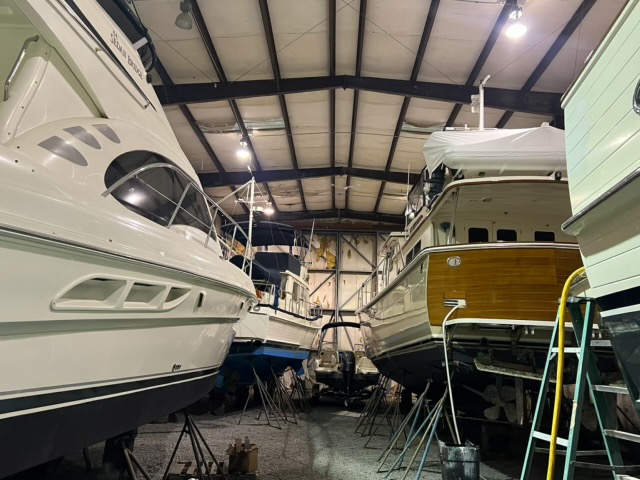Awlgrip Cleaning and Maintenance for a Long Life Finish
What You Should Do…
When you apply an Awlgrip finish to your boat, do not consider it to be a no-maintenance finish, but rather a low-maintenance finish. If you follow the manufacturer’s recommendation, you should get years of service from your finish.- Regular Cleaning will avoid build of dirt, grease and other contaminants which can slowly cause premature aging of Awlgrip or Awlcraft 2000. This premature aging can cause the finish to appear dull.
- Wash the surface regularly with fresh water and Awlwash Wash Down Concentrate (73234) which is formulated to clean Awlgrip and Awlcraft 2000 topcoats. Awlwash does not contain alkalies, acids, or abrasives. Some “marine soaps” are not suitable for use on painted surfaces. When using Awlwash, it is important to dilute as specified on the label.
- When washing it is important to keep the surface wet to prevent Awlwash from drying on the surface. Use soft, non-abrasive cloths, sponges or washing mits when washing.
- Thoroughly rinse all surfaces with fresh water after washing to remove all detergent residue. A water softener is recommended to eliminate hard water residue. Wiping the surface dry with a chamois or soft cotton towel is recommended.
- If water spots occur, they can be removed with Awlcare Protective Polymer Sealer (73240).
For Awlgrip Only
Solvents such as Awl-Prep-T0008, Awl-Prep Plus-T0115 (or T0340 Surface Cleaner in Europe), Awl-Prep 400-T0170, toluene, lacquer thinner, M.E.K., acetone, or kerosene may be used to soften or remove heavy build up of grease and grime, felt tip markings, or aerosol spray paint on the Awlgrip Topcoat.
For Awlgrip 2000 Only
Use only milder solvents to remove stubborn stains. AWL- PREP T0008, Awl-Prep 400-T0170, mineral spirits, xylene, and kerosene are acceptable for use on Awlcraft 2000.
For Awlgrip AND Awlcraft 2000
- When using solvents to remove stains, test an inconspicuous area first. Apply cleaning solvents with soft clean cloths. Wipe up solvent quickly. Do not allow solvent to dry on the surface or puddle and soak into the surface. After the use of solvents, wash these areas with Awlwash (73234) and water to remove any residue.
- Use Awlcare (73240), by hand only, to remove stubborn diesel soot stains.
- Always thoroughly rinse all surfaces with fresh water after cleaning with Awlwash or solvents. Latent solvent residue can attack the Awlgrip or Awlcraft 2000 Topcoat, while the wash down residue will attract dirt.
- Use distilled white vinegar and hot water to remove stubborn salt stains. Washing with Awlwash after use of vinegar is recommended.
Protecting the surface with Awlcare (73240) will help maintain the gloss of Awlgrip and Awlcraft 2000. Awlcare is a hand applied, non-abrasive, synthetic polymer. It will remove mild stains, water spots and diesel soot while increasing resistance to attack from acid rain and other pollutants, when applied regularly. It contains no harsh abrasives. Awlcare leaves a non-yellowing, protective polymer coating which lasts through multiple washings. Use Awlcare to temporarily seal and restore gloss to painted surfaces dulled by age or mistreatment.
What You Should Not Do…
Do not use traditional waxes. General: Traditional waxes break down rapidly. The residue can cause the topcoat to appear yellow, plus it attracts dirt. This creates the need to maintain the wax, increasing overall maintenance. Traditional waxes which contain no abrasives probably do little harm to the coating, but offer no benefit.
Awlgrip has developed Awlcare Protective Polymer Sealer (73240) for those who want to enhance their finish and need the additional cleaning power of a hand applied, dry wash product. Awlcare is a non-yellowing sealer that will protect both Awlgrip and Awlcraft 2000 with regular applications. Hand applied Awlcare will not harm Awlgrip’s topcoats and can easily be removed with Awl-Prep Plus-T0115 (or T0340 Surface Cleaner in Europe) when it is time to repaint.
For Awlgrip Only
Regular applications of Awlcare will help temporarily seal and restore shine to painted surfaces that have become porous due to age or mistreatment, helping to maintain a satisfactory appearance until there is time to repaint.
For Awlgrip Only
Awlcare Protective Polymer Sealer will help maintain the gloss on Awlcraft 2000 topcoats with regular applications. Especially those which have been buffed or polished. Remember, Awlcare is only applied and buffed by hand. Never apply or buff Awlcare with a machine.
- Do not use abrasives, scratch pads, or compounds. Scratching the surface gives dirt a place to cling while wearing out the resin layer. Using abrasives of any kind will reduce the overall life of the finish and voids the Awlgrip Limited Warranty.
- Do not allow contact between Awlgrip or Awlcraft 2000 Topcoat and teak cleaners. Most teak cleaners contain acids or caustic agents that stain and discolor an Awlgrip or Awlcraft 2000 Topcoat.
- Do not allow metal polishes to dry on the surface of Awlgrip or Awlcraft 2000. Metal polishes may discolor and stain the painted surface. Metal polishes contain acids. Rain water and dew running off metal fittings will spread metal polish residue onto the paint surface and will etch and dull the paint finish. Washing freshly polished metal fittings thoroughly with Awlwash and water can help eliminate polish residue and reduce the metal polish run off.
- Do not use strong solvents (e.g. lacquer thinner, M.E.K., acetone) to clean Awlcraft 2000, Awl-Brite or Awlspar Varnish.
- Do not allow wet equipment (e.g., seat cushions, coils of line, sails, sail covers, coolers) to trap and hold moisture against Awlgrip or Awlcraft 2000 Topcoats. This condition can result in blistering or delamination of the Awlgrip or Awlcraft 2000 Topcoat.
- Do not use acrylic Teflon coatings over an Awlgrip or Awlcraft 2000 Finish. Use of these coatings void the Awlgrip Limited Warranty.
For Awlgrip and Awlcraft 2000 Winter Storage
Do not “shrink wrap” or tightly bind Awlgrip or Awlcraft 2000 Topcoat surfaces with plastic wrappings.
When tarping a boat for storage, the cover system should be ventilated to allow the coating system to “breathe”. Covers and tarps, whether synthetic or natural fiber, should not be pulled tight to surfaces painted with Awlgrip or Awlcraft 2000 Topcoat. This condition can trap and hold moisture on the surface and may result in loss of gloss, blistering, or delamination of the topcoat.
Caution should also be used to ensure that the tarp does not chafe against the Awlgrip or Awlcraft 2000 Surface. Such chafing, especially when accompanied by airborne dirt, can abrade the surface and cause premature loss of gloss.


